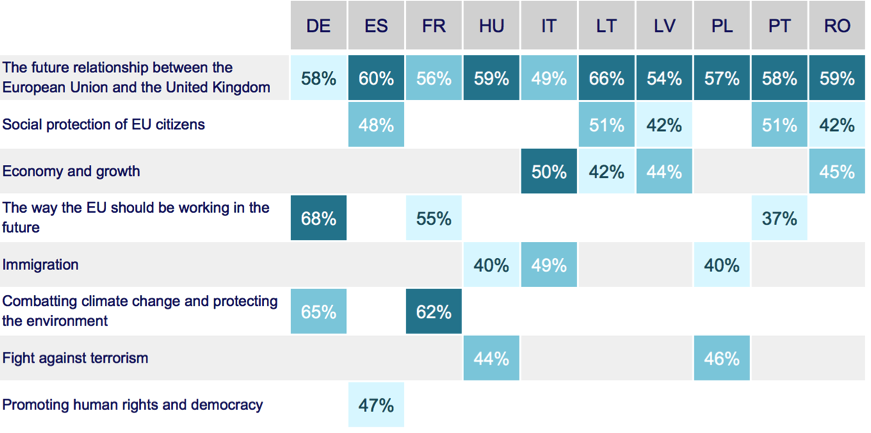Voting for a British MEP? EU nationals in the UK polled about EU elections
About half of EU nationals in the UK consider the election of the European parliament “very important”. But many did not vote in 2014 because they did not know where or how to do so, they did not feel “sufficiently informed” or they were not registered, according to a European parliament survey.
The research, seen by Europe Street News, was carried out by public affairs consultancy Kantar between June and August 2018. It targeted EU citizens with 10 European nationalities via Facebook adverts and received more than 5,500 responses from Polish, Romanians, Germans, Italians, Lithuanians, French, Spanish, Portuguese, Latvians and Hungarians in the UK.
The European parliament office in London wanted to understand their views ahead of the first electoral campaign without the UK. Now Britain is expected to participate in the EU elections, unless the UK parliament passes the EU withdrawal agreement before 22 May. If polls take place, EU nationals in the UK and British residents in the EU will be able to vote and stand as candidates. But will they?
Lack of information
Almost half (49%) of the survey respondents consider voting in the European elections very important. The percentage is especially high among Germans (72%) and Italians (64%). About half of Romanians, Spanish, French and Portuguese think so too, while only 38% of Polish and 27% of Latvians share this view.
However, only 30% of those surveyed said they voted in the European elections of 2014. Again, the highest percentage was among Germans (58%) and Italians (49%) followed by French nationals (44%), while Lithuanians (18%) and Latvians (14%) came last.
Among those in the UK for at least 5 years who voted, less than half (41%) opted for a British candidate rather than one from their home country. The majority of Germans (59%), Portuguese (58%) and French (54%) voted at a polling station in the UK for a British party, against 32% of Hungarians, 30% of Spanish and 22% of Italians.
EU nationals in the UK for at least 5 years who did not vote said they didn’t know where or how to do so (25%), they did not feel “sufficiently informed” (24%), they wanted to vote but they were not registered (17%), they did not have time or had something more important to do, or they thought that their vote would not matter.
Yet, the number of EU nationals voting this year should be higher, according to the responses. 45% said that they are likely to vote, with percentages ranging between 34% of Hungarians (up from 24% in 2014) to 62% of Italians and 69% of Germans.
The survey also found that 90% of respondents consider themselves European citizens, 60% have fairly or very positive views of the European Union, and 78% are fairly or very interested in European affairs (a percentage that reaches 93% for Germans).
Among the themes considered important for the electoral campaign, 57% mentioned the future relationship between the UK and the EU, with especially high percentages for Lithuanians (66%), Spanish (60%), Romanians and Hungarians (59%), Germans and Portuguese (58%).
However, Germans in the UK are more concerned about the functioning of the European Union (68%) and climate change (65%), which also ranks higher among the French (65%). Italians worry about the economy and immigration, while Polish and Hungarians are concerned about terrorism.

How to vote in the UK
European elections take place every 5 years. Between 23 and 26 May 2019 citizens from 28 EU countries will elect 751 Members of the European parliament (MEPs), a number that will be reduced to 705 with a re-distribution of seats among EU countries after Brexit. The UK is due to vote on Thursday 23 May and elect 73 MEPs.
To vote in the UK, EU nationals must register downloading and filling in the European Parliament voter registration form, and sending it to the local Electoral Registration Office by 7 May. It is a different procedure than the one for local elections. The registration procedure for Northern Ireland is explained here.
EU citizens living in another EU member state can vote for MEPs either in the country of residence or in the country of origin. It is illegal to vote in more than one country. So EU nationals could alternatively vote for MEPs of the country they are from. But not all states allow their citizens abroad to vote. Where this is allowed, the vote can usually be cast by post, in person at the embassy, or in the home country. Information and deadlines are available on the websites of the embassies and of the national electoral authorities.
EU citizens living in another EU member state can also stand as candidates. Political parties set their own criteria and the dealine for UK candidates is 25 April.
How British citizens can vote in the EU
British citizens living in EU countries can also vote. If they have lived abroad for less than 15 years, they can vote for candidates in the UK or in the host country. If they have been outside the UK for more than 15 years, they can only vote in the EU country where they reside.
A newsletter by the coalition of British in Europe listed the deadlines to enroll in the electoral register of each EU country. In half of them the cutoff date has already passed, but it is still possible to register in Estonia, Croatia, Lithuania, Germany, Hungary, Ireland and Poland.
More information about the European elections can be found at the following links:
- European parliament campaign “This time I am voting”.
- UK electoral commission.
- Europe Votes 2019 explainer of how the EU elections work in the UK.
- European parliament search your MEP.
- European parliament projection of seats.
- “What Europe does for me” portal.
Claudia Delpero © all rights reserved.
Photo by Stefan Schweihofer via Pixabay.





